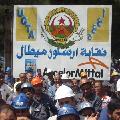
Nationalise the plant under democratic workers’ control
Since 20 June, several thousand workers at Arcelor Mitall’s steel plant in Hel-Hadjar, near the city of Annaba, in the North East of Algeria, have been on indefinite strike, in a dispute fuelled by pay issues. The strikers are demanding, among other things, a pay rise of between 13% and 20%.
Arcelor Mittal, the world’s biggest steel-maker, and the biggest foreign investor in Algeria outside the oil and gas sectors, was given a 70% share of the previously state-owned El-Hadjar plant in October 2001, with Algerian state-owned steelmaker SIDER retaining a 30% share. The workers threatened to strike unless the government re-nationalised the company or, at least, took a controlling stake in it.
This factory, one of the biggest industrial sites in the country, produces 750,000 tonnes of steel a year, and employs some 7,200 workers. Five thousand of them previously took part in a general assembly and voted unanimously to paralyse the plant. A worker at the plant was quoted as saying that 95% of the workforce was now on strike. “We will continue until our demands are fully met”, the same worker said. The workers at this same factory already staged a nine-day strike earlier this year in a dispute over the shutting down of a coking plant at the complex and the threat of job losses.
The anger is generalised
In the past few months, exasperation over rising prices, poor housing and unemployment has led to successive waves of strikes and protests in Algeria. Doctors, teachers, public servants, industrial workers, etc have engaged in various strike actions, with pay rises as a central demand. As a previous article on this site already commented, “these disputes are encouraging other sectors to take the road of struggle with their own demands”. This is particularly true in cases of workers actually achieving victory, such as in the recent 8-day national strike of railway workers in May.
10,000 employees of the state-owned SNTF railway company, demanding an increase in wages, paralysed the whole network in an indefinite strike lasting 8 days. Most of the rail workers were receiving salaries below the minimum wage (which stands at 15,000 dinars – about 150 euros, a month). This railway strike was the biggest of this kind since Algeria won formal independence in 1962. Alarmed by the contagious effects of this dispute, the government agreed to a 20% pay rise, “a concession economists have warned could encourage more strikes in this North African country”, commented Reuters news agency in the aftermath of the strike.
Re-nationalise the plant! Private and public companies must be taken out of capitalist and bureaucratic mismanagement!
Importantly, the strikers from Arcelor Mittal have received solidarity and support of the workers from the SNVI plant in Rouiba (Algiers), as well as from workers of many other companies, giving them encouragement to pursue their struggle.

The CWI also strongly supports this strike, and would suggest not only the nationalisation of the entire plant, but also it being put under the control of democratically elected and accountable representatives of the workforce, as well as linking this to similar measures in other sectors faced with similar problems, bringing the entire economy under a genuinely democratic socialist plan. This would serve as a boost, giving the working class a decisive role in the economy, in order to use the vast resources of the country for the benefit of all, while avoiding the mismanagement and corruption which have become a feature wherever the mafia-style rulers in power control investment decisions in public companies.
Special financial appeal to all readers of socialistworld.net |
Support building alternative socialist media Socialistworld.net provides a unique analysis and perspective of world events. Socialistworld.net also plays a crucial role in building the struggle for socialism across all continents. Capitalism has failed! Assist us to build the fight-back and prepare for the stormy period of class struggles ahead. Please make a donation to help us reach more readers and to widen our socialist campaigning work across the world. |
Donate via Paypal |
| M | T | W | T | F | S | S |
|---|---|---|---|---|---|---|
| 1 | 2 | 3 | 4 | 5 | 6 | |
| 7 | 8 | 9 | 10 | 11 | 12 | 13 |
| 14 | 15 | 16 | 17 | 18 | 19 | 20 |
| 21 | 22 | 23 | 24 | 25 | 26 | 27 |
| 28 | 29 | 30 | ||||


Be the first to comment